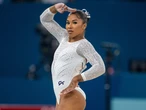At the Exceptional Women Alliance (EWA), we enable high-level women to mentor each other so that each leader can achieve personal and professional happiness through sisterhood. As the nonprofit organization’s founder, chair, and CEO, I am honored to interview and share insights from some thought leaders participating in our peer-to-peer mentoring.
This month, I am thrilled to introduce Elisa Bannon Jones, an accomplished business executive leader with over 20 years of experience in retail, automotive, technology, and health and wellness industries. Her strategic and HR executive leadership with some of the largest Fortune 500 companies in publicly traded and private equity spaces make her a valuable source of insights. Her book, The American Character: Women Overcoming Bias to Become President of the United States, was released in September 2024.
Q: What inspired you to write your book?
Elisa Bannon Jones: As a chief people/human resources officer, I specialized in building company cultures that foster engagement, opportunity, and a sense of belonging in the workplace. This unique perspective, combined with my graduate research focusing on American culture, inspired me to write it as a multidisciplinary examination of the American experience, focusing the research on women becoming U.S. presidents.
Q: Can you share the book’s core thesis? What central message do you hope readers take away?
Jones: The American Character explores the intricate challenges female candidates face, particularly those aspiring to the highest political office in the United States. The book provides a nuanced analysis of women’s barriers in the political arena through extensive research in American literature, political cartoons, social media, and television.
Central to this study is the concept of the “double bind,” a paradox where women are evaluated against conflicting standards—both masculine and feminine—leading to criticism regardless of how they navigate these expectations. Women may be faulted for exhibiting too many traditionally masculine traits or for not embodying enough of them, highlighting a pervasive and deeply entrenched gender bias in politics. This examination reveals the complexities of these biases and underscores the urgent need for a more informed and equitable approach to understanding and addressing gender dynamics in political leadership.
Q: Were there any surprising findings or revelations during your research?
Jones: Building a best-in-class organizational culture shares notable parallels with the process of women running for president in the U.S. In organizations, pulse surveys and engagement metrics assess how well the company aligns with its vision and values, much like how general elections determine political leadership. Boards of directors conduct rigorous evaluations and often implement succession plans to ensure effective leadership transitions. However, presidential candidates are not subjected to the same structured development and assessment processes.
This disparity raises a crucial question: Why isn’t there a similarly strategic approach to preparing women for the U.S. presidency? Just as organizations have seen an increase in female CEOs—from two in Fortune 500 companies in 1998 to 52 in 2024—the path to the U.S. presidency remains uncharted for women. With targeted focus and development, there is potential for women to be better prepared to ascend to the highest office in the nation. This comparison highlights the need for a systematic approach to nurture and support female presidential candidates, aiming for progress that mirrors advancements in corporate leadership.
Q: What common biases and obstacles do women face when aiming for the highest leadership positions?
Jones: Embedded within the American character are four prevalent themes that shape how women are perceived: The “ladies” concept dictates how women should act, the “babies” theme emphasizes a woman’s duty to bear children, the “money” aspect highlights fair compensation for work done, and the “honey” standard refers to beauty ideals. These themes evolved into biases affecting how women are judged in the workplace and politics. The first step in changing the mindset is understanding and recognizing the existing bias. Then, the planning and mentoring can begin, starting with assessment as a self-awareness tool, then targeted leadership development, hands-on experience, and a coach to help mentor and guide the candidate through their growth plan.
Q: How do you see the role of mentorship and support networks in overcoming these barriers?
Jones: Whether you aspire to become a CEO or the president of the United States, effective leadership transcends mere knowledge, skills, and abilities; it is fundamentally anchored in the strength of your mentorship network, which helps you evolve. Having mentors who are themselves at the pinnacle of leadership can provide a decisive advantage. These mentors bring invaluable experience and offer trustworthy guidance that can significantly accelerate your readiness for top roles.
It’s crucial to carefully vet potential mentors to ensure they offer valuable support, coaching, and advice. Effective mentorship is not a standalone solution but a vital component of a comprehensive preparation strategy that includes hands-on experience and rigorous self-assessment. Such mentorship can be a game-changer, equipping you with the insights and techniques to navigate complex challenges and advance your career.
While mentors cannot directly eliminate systemic biases, they play a pivotal role in evolving their mentees’ mindsets and preparing them to overcome obstacles. A well-rounded network of experienced leaders broadens access to diverse perspectives and knowledge, enriching one’s understanding and enhancing one’s ability to lead effectively.
Q: How has writing this book changed your perspective on women in leadership?
Jones: Exploring women’s history and the gendered roles that have shaped the American character has been an enlightening experience. I recall my father calling me a “women’s libber” in the 1970s when I expressed my ambition to pursue a career. To his credit, by the 1980s, he evolved his perspective and encouraged me to live on the university campus, fostering a fearless attitude that has stayed with me.
In examining the themes of “ladies, babies, money, and honey,” it’s clear that these issues have resurfaced in the current political climate, reflecting a return to the traditional perceptions of women embedded in the American character. This historical context reminds us not to take progress for granted. Women must proactively develop their skills and networks, moving from fearlessness to deliberate, intentional persistence.
Larraine Segil is founder, chair, and CEO of the Exceptional Women Alliance.





No comments